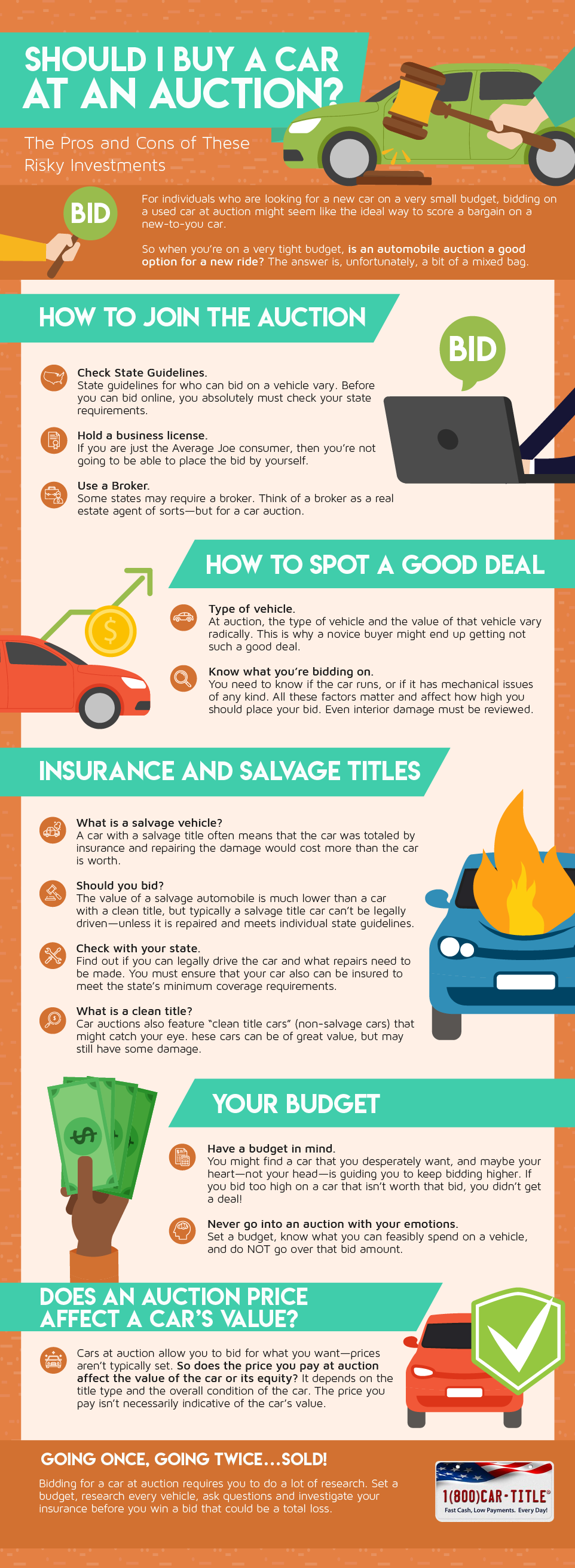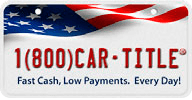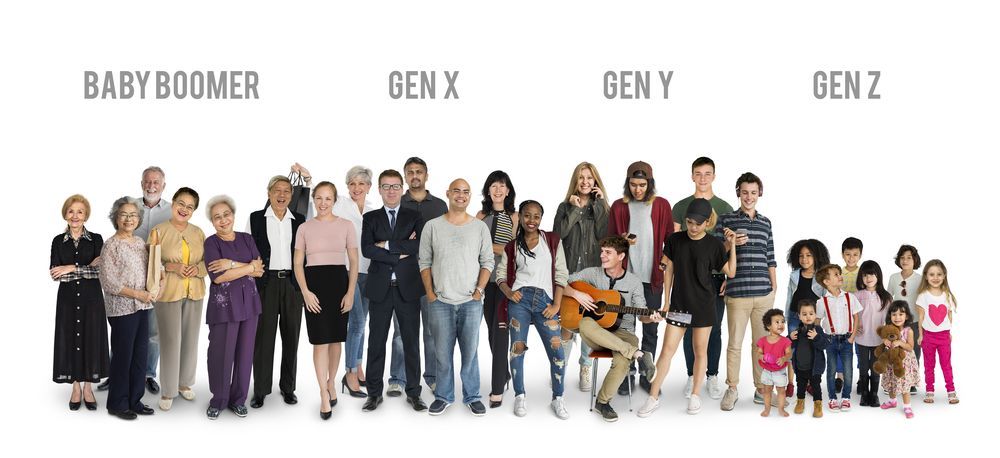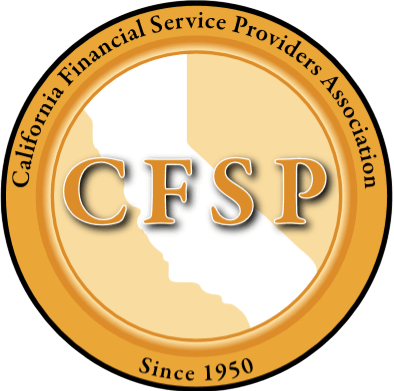Should I Buy a Car at an Auction?
By carloansadmin • November 27, 2018
For individuals who are looking for a new car on a very small budget, bidding on a used car at auction might seem like the ideal way to score a bargain on a car. However, before you get caught up in a bidding war on a potential dream ride, there are a few things you need to know about the bidding process and auto auctions.

Yes, auctions allow you to bid for a vehicle at what seems like pennies on the dollar. And, in theory, you could walk away from the auction with a very cheap car—paying perhaps only a few hundred dollars. However, not all cars at auction are worth the hassle of the bid, because some cars at auction have more problems than positives.
So when you’re on a very tight budget, is an automobile auction a good option for a new ride?
The answer is, unfortunately, a bit of a mixed bag.
How to Join the AuctionMany automobile auctions require those who bid to hold a business license. This means that if you are just the average Joe consumer, then you’re not going to be able to place the bid by yourself. Instead, many individuals looking for a car at auction use a broker. Copart USA is one of the most well known automobile auctioneers; to bid online during one of the business’ auctions, you need to register as a Copart member. However, state guidelines for who can bid on a vehicle vary; this is where a dealer or other business license may come into play. Before you can bid online via Copart or any other auto auction, you absolutely must check your state requirements.
If you discover that you do, in fact, need a special business license to bid and buy, there are other options. Copart notes that you can use a broker to guide the transaction. Think of a broker as a real estate agent of sorts—but for a car auction.
All auctions are the same—the highest bidder wins. But how high do you go? Depending on the automobile, its make/model and the vehicle’s history, the gritty details could get frustrating for a novice.
The Highest Bid?
Copart specializes in auctioning all types of automobiles—including salvage vehicles. So what is a salvage vehicle? A car with a salvage title often means that the car was deemed totaled by an insurance compaint and repairing the damage would cost more than the car is worth. The car might have been in a crash, flooded, damaged by hail or suffered some other completely random fate. Regardless, the salvage title means the car holds very little equity or resale value.
Not all cars at auction are salvage, though. Some have clean titles but could have body damage or other issues. And you may discover cars that are used but have no damage. At auction, the type of vehicle and the value of that vehicle vary dramatically. Therefore a novice buyer might end up getting not such a good deal.
You absolutely need to know what you’re bidding on when you participate in an automobile auction. How much damage is there to the car? Is the damage repairable, and, if so, how much would the repairs cost? You need to know if the car runs, or if it has mechanical issues of any kind. All these factors matter and affect how high you should place your bid. Even interior damage must be reviewed.
Just because you find a high-end automobile at a great price does not mean it’s a steal. If that car doesn’t run, if the engine may have been flooded and the car was declared a total loss or if the body damage costs too much to repair, you’re left with a very bad purchase.
Of course, if you bid and win a car with a salvage title, you also could face other issues.
Insurance and Salvage Titles
If you’re scouring the auction list and see an amazing car that has a salvage title, should you bid? Maybe it runs great, has a near-perfect body and doesn’t appear to have any problems. That high end car sure looks like a steal, right?
Every salvage title means that the vehicle holds a mere fraction of the value it could. However, one of the biggest issues in purchasing a car with a salvage title is finding insurance for the car and driving it legally. Many automobile insurance companies will be hesitant—if not completely resistant—to provide comprehensive insurance on a salvage vehicle. The value of a salvage automobile is much lower than a car with a clean title; also, typically a salvage title car can’t be legally driven —unless it is repaired and meets individual state guidelines. Titles on cars damaged by hail may have other title notations or could still be noted “salvage.” Many insurance companies may only provide liability insurance for driving a car with a salvage affiliated title. This means that if you crash the car, then your insurance won’t pay for repairs.
If you purchase a car with a salvage title, you must check with your state to find out if you can legally drive the car and what repairs need to be made. Of course, you must ensure that your car also can be insured to meet the state’s minimum coverage requirements. If you can’t drive the car or you can’t insure it, then your bid was money not well spent.
Your Budget
Car auctions also feature clean title cars that might catch your eye. Unlike vehicles with salvage titles, these cars hold value, although they might still have some damage. Know what you’re bidding on before you bid. You also should have a budget in mind before you enter a bidding contest.
Auctions can be filled with passion and emotion. You might find a car that you desperately want, and maybe your heart—not your head—is guiding you to keep bidding higher. This is how an auction situation might get out of hand very quickly. If you bid too high on a car that isn’t worth that bid, you didn’t get a deal!
Never go into an auction with your emotions. Set a budget, know what you can feasibly spend on a vehicle, and do NOT go over that bid amount. During an auction, you must know when to walk away. This may mean that you lose the car, but if losing the car means keeping your finances in check, then losing the bid was worth the price.
If you’re working with a broker, be sure to research them. Your broker is there to work for you; don’t hesitate to talk to them about the bidding process. Copart notes that some brokers might have physical locations that you can visit —so stop by!
Does an Auction Price Affect a Car’s Value?
Cars at auction allow you to bid for what you want—prices aren’t typically set. So does the price you pay at auction affect the value of the car or its equity? The answer really depends on the title type and the overall condition of the car. The price you pay isn’t necessarily indicative of the car’s value. A car’s resale value is affected more by the title, condition, age, make/model and mileage. Of course, if you pay a real low price for a car at auction, it could mean that maybe other buyers understand something about the car you don’t. Maybe it’s not a great model or perhaps they see some little details that make the car less of a hot buy for them.
Title Loans & Auction Buys
What if in the future you need to use that auction buy as the collateral for quick cash in the form of a title loan? Does an auction car garner less money in the form of title loan cash? Yes and no. Most lenders would not consider a salvage title for collateral for a title loan. So if you buy a salvage car, fix it up to make it legal for the road, but it still may not hold much cash value. But if you purchase a vehicle with a clean title, low mileage and in nice condition, that purchase could be used to back a title loan.
Going Once, Going Twice…Sold!
While automobile auctions can lead to a great deal, for some novice buyers, auctions may not be the best option. Bidding for a car at auction requires you to do a lot of research. You must know what you’re buying, the implications of any damage to the car and how the title affects a car’s value. Remember that salvage titles might have insurance limitations and they might even be illegal to drive in your state. Before the auctioneer declares you the winner, make sure you really do want to win the bidding war. Because if you aren’t careful, you could drive off with a car that holds little value, has irreparable damage or is uninsurable. Don’t get caught up in the heat of the auction; set a budget, research every vehicle, ask questions and investigate your insurance before you win a bid that could be a total loss.
More Resources
- Apply for a Title Loan Online
- Refinance Your Loan
- Get an Estimate on a Title Loan
- Get a Car Title Loan in California
- Car Title Loans Georgia
- Title Loans
- Utah Car Title Loans
- Title Loans Home Page
- Get a Loan With a Pink Slip
- Old Car Title Loans
- Car Title Loans in Sacramento
- St Louis Title Loans
- Fresno
- Giving Back
- Arizona Title Loan
- Title Loan or Payday Loan?
- Car Title Loan Options
- Title Loans Car Improve my Credit?
- Prestamos
- Get a Title Loan with your RV
- Salt Lake City Title Loans
- Bakersfield Title Loans
- Idaho Title Loans
- Moneygram
- Special Programs
The post Should I Buy a Car at an Auction? appeared first on (EN) 1(800) Car-Title®.
HOW MUCH IS MY CAR WORTH?


USA Patriot Act Disclosure: Important information about procedures for opening a new account
To help the government fight the funding of terrorism and money laundering activities, Federal law requires all financial institutions to obtain, verify, and record information that identifies each person who opens an account. What this means for you: When you apply for a loan, we will ask for your name, address, date of birth, and other information that will allow us to identify you. We may also ask to see your driver's license or other identifying documents.
Loans may be made by one of several lenders, including: Wilshire Commercial Capital L.L.C. dba 1 (800) Car-Title and Wilshire Consumer Credit, a licensed lender in certain states. Loans not available in all states. In California, loans are made pursuant to a Department of Financial Protection & Innovation (DFPI) Finance Lenders License. See State Disclosures for additional information.
Accessibility Statement. We are committed to ensuring digital accessibility for people with disabilities. We are continually improving the user experience for everyone and applying the relevant accessibility standards in compliance with Web Content Accessibility Guidelines. For feedback on our website accessibility or if you have any problems with the access of our website please call our toll-free number 800-589-0290 or email us at WilshireCustomerCare@WilshireConsumer.com and we will assist you.
Wilshire Commercial Capital, LLC dba 1 (800) Car-Title and Wilshire Consumer Credit is located at 4727 Wilshire Blvd, Suite 100, Los Angeles, CA 90010.
NMLS ID:907578 | Click here for the NMLS Consumer Access Database.
TO REPORT A PROBLEM OR COMPLAINT WITH THIS LENDER, YOU MAY WRITE OR CALL Tracy Bergiman, Director of Compliance, 4751 Wilshire Blvd. Suite 100, Los Angeles, CA 90010, 323-837-5775, tbergiman@westlakefinancial.com.
New Mexico Only: This lender is licensed and regulated by the New Mexico Regulation and Licensing Department, Financial Institutions Division, P.O. Box 25101, 2550 Cerrillos Road, Santa Fe, New Mexico 87504. To report any unresolved problems or complaints, contact the division by telephone at
(505) 476-4885 or visit the website: https://www.rld.nm.gov/financial-institutions/.
Copyright. Wilshire Commercial Capital, LLC. dba 1 (800) Car-Title and Wilshire Consumer Credit. All Rights Reserved.











